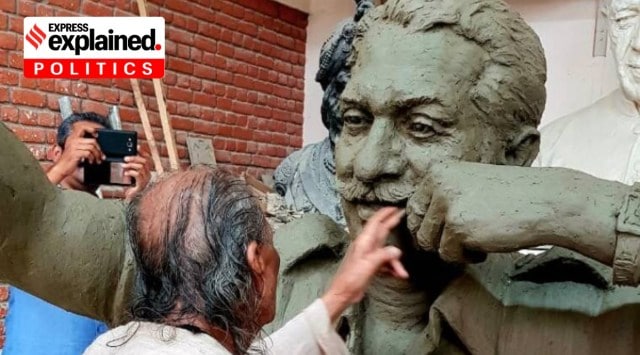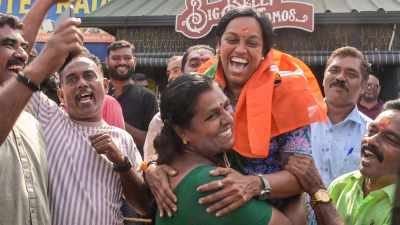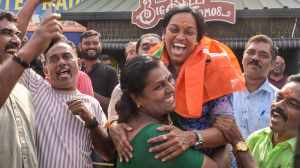Who is Dilip Singh Judeo, whose statue RSS chief Mohan Bhagwat will unveil today?
The 12-foot statue, sculpted by Ram V Sutar (whose earlier creations include the Statue of Unity of Sardar Vallabhbhai Patel in Gujarat and the Statue of Prospertity of Nadaprabhu Kempegowda in Bengaluru), is being seen as an attempt by the BJP to revive both Judeo’s and its own influence in the state.
 Sculptor Ram V Sutar with late BJP leader Dilip Singh Judeo’s statue. (Express Photo)
Sculptor Ram V Sutar with late BJP leader Dilip Singh Judeo’s statue. (Express Photo)Rashtriya Swayamsevak Sangh (RSS) chief Mohan Bhagwat will be in Jashpur, Chhattisgarh, on November 14 (Monday) to unveil a statue of the late Bharatiya Janata Party (BJP) leader and former Union Minister late Dilip Singh Judeo.
The 12-foot statue, sculpted by Ram V Sutar (whose earlier creations include the Statue of Unity of Sardar Vallabhbhai Patel in Gujarat and the Statue of Prospertity of Nadaprabhu Kempegowda in Bengaluru), is being seen as an attempt by the BJP to revive both Judeo’s and its own influence in the state.
Who was Dilip Singh Judeo?
Judeo was born on March 8, 1949 into the erstwhile royal family of Jashpur. After Independence, the princely state became a part of the Raigarh district of undivided Madhya Pradesh. After Chhattisgarh was carved out of MP in 2000, Jashpur became a part of the new state.
Judeo’s father, Raja Vijay Bhushan Singh Deo, was the last ruling prince of Jashpur.
He was elected as a Lok Sabha MP from Chhattisgarh’s Bilaspur in 2009, after being elected to the Rajya Sabha thrice (in 1992, 1998 and 2004). He was also the Minister of State for Environment and Forests in Prime Minister Atal Bihari Vajpayee’s Bharatiya Janata Party-led National Democratic Alliance (NDA) government.
He was also a member of the RSS and the Vishwa Hindu Parishad (VHP).
Known as a charismatic leader, Judeo is known for solidifying BJP’s presence in the state with his contributions to Akhil Bharatiya Vanvasi Kalyan Ashram, which worked extensively with the indigenous population of the state. According to his Lok Sabha profile, he was interested in ‘tribal upliftment; preservation of Hindu temples and shrines; checking tribal conversion; and Ghar Wapsi programme of Hindus’.
He is credited with starting the controversial Ghar Wapsi campaign (the supposed ‘re-conversion’ of indigenous people to Hinduism) in Chhattisgarh. Judeo would wash the feet of indigenous people who had converted to Christianity, facilitating their ‘re-entry’ to the Hindu religion in highly publicised events. Even though his actions at the time got little support and much criticism from other party leaders, he ended up playing a big role in setting the political narrative in Chhattisgarh.
“I am a widely travelled man. I know the tactics adopted by missionaries in many countries. It’s not just conversion, it will lead to changing the character of the country. The Cross has come up near Hindu temples. Will we be able to construct a Hanuman temple anywhere in the Vatican? I am not against Christians, but only against conversion. I studied in a Christian institute in Ranchi after all,” he had said in Akhrar village in Bilaspur district while campaigning for the 2009 Lok Sabha elections.
Judeo’s influence over the indigenous community had played a predominant role in BJP’s electoral dominance in the state, particularly in the Surguja-Sambhag-Bilaspur belt . From 2003, when the first Assembly elections in Chhattisgarh were held, the party had come to power for three consecutive terms. It only lost power to the Congress in the 2018 election, in which it faced a humiliating defeat – it got only 15 seats in the 90-member Assembly.
Accusations of bribery and resignation
On November 16 2003, just a few days before the Assembly polls, The Sunday Express had reported that Judeo, then a strong candidate for the chief ministerial position in Chhatisgarh, had been caught on camera purportedly accepting a bribe for mining rights in the state.
In the video, Judeo could be heard purportedly saying, “Paisa Khuda to nahin par Khuda ki kasam Khuda se kam bhi nahin (Money isn’t God but, swear on God, it’s no less than God)”. He had also said, ‘‘As long as I don’t see it (the VCD), I will contradict it. I’m fighting international forces, all this is part of it.”
However, he was forced to resign from his position as a Union Minister. Right after his resignation, he said in an interview, “You need an army to stop conversions and you need provisions for that army. There might be obstacles and the time is limited. Suppose someone gives these provisions, this is misunderstood. We have to keep all these possibilities in mind. Who is going to foot the bill?”
In the same interview, he also said that Mahatma Gandhi had received money “from Birla” during the freedom struggle.
Judeo’s legacy now
Judeo passed away nine years ago, on August 14, 2013. The unveiling of his statue comes ahead of Assembly elections scheduled in Chhattisgarh next year. The party has launched a campaign to win back its support among the Scheduled Tribes and Scheduled Castes,which it belives is largely due to the absence of influential leaders from these communities.
BJP leaders also believe that infighting in the party’s state unit, as well as tragedies in the Judeo family (two of his sons died early— elder son Shatrunjay Sing Judeo in 2012, and Yudhvir Singh Judev, an MLA, in 2021 at the age of 39) dented Judeo’s political legacy.
Judeo’s third son Prabal Pratap, 43, who had worked in the US for 12 years and returned to Jashpur to take over his then-ailing father’s Ghar Wapsi campaign, said the statue was a plan born out of the demands of the tribals in the region since his father’s death.
“In 2013, when then chief minister Raman Singh was addressing the tribal people in the shradhanjali sabha of my father, the locals had made a demand – two of his statues should be erected in Jashpur and Kunkuri. Although the work was begun, it got delayed after the Congress government came to power. It was expected to be unveiled at a function during the first break during the Covid pandemic. But the breakout of Omicron delayed it further,” Prabhal had told The Indian Express earlier.
“It is big that the Sarsanghchalakji (Bhagwat) is going to be here to unveil my father’s statue. Along with me, tribals in this region also feel honoured,” Prabal added. “Dilip Singh Judeoji is remembered with reverence and gratitude as a leader who initiated and personally conducted the Ghar Wapsi movement for tribals. His contribution is no less than a civilisational rescue.”
- 01
- 02
- 03
- 04
- 05






































